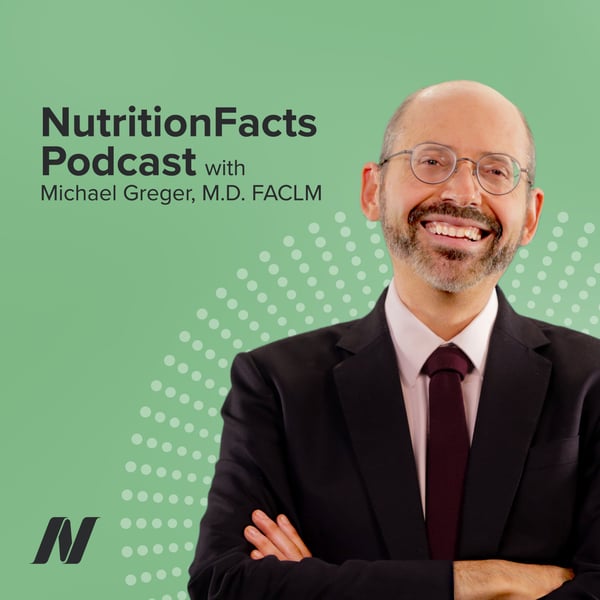Industry Bias: Misleading Us About Meat (Part I)
Nutrition Facts with Dr. Greger
[email protected]
4.8 • 3.6K Ratings
🗓️ 8 December 2022
⏱️ 20 minutes
🧾️ Download transcript
Summary
Transcript
Click on a timestamp to play from that location
| 0:00.0 | You may have heard the expression knowledge is power. Well, today we're going to give you more power to control your diet lifestyle by giving you the facts. |
| 0:11.0 | Welcome to the Nutrition Facts Podcast. I'm your host, Dr. Michael Greger. |
| 0:17.0 | Today we continue our series on how industries impact dietary and health guidelines and pick things up by taking a close look at corporate criticism of scientific nutrition literature. |
| 0:28.0 | While randomized controlled trials are highly reliable and assessing interventions like drugs, they're harder to do with diet. |
| 0:36.0 | Dietary diseases can take decades to develop. It's not like you can give people placebo food and it's hard to get people to stick to assigned diets, especially for the years it would take to serve effects on hard endpoints like heart disease or cancer. |
| 0:51.0 | That's why we have to use observational studies of large numbers of people and their diets over time to see which foods appear to be linked to which diseases. |
| 1:00.0 | And interestingly, if you compare data obtained from observational population studies versus randomized trials on average, there's little evidence for significant differences between the findings. |
| 1:13.0 | It's not just in the same direction of effect, but of the same general magnitude of the effect and about 90% of the treatments they looked at. |
| 1:22.0 | But wait, what about the hormone replacement therapy disparity I talked about in the last video? |
| 1:28.0 | It turns out when you go back and look at the data, it was just a difference in timing in terms of when the premerin was started and they actually showed the same results after all. |
| 1:37.0 | But even if observational trials did provide lower quality evidence, maybe we don't need the same level of certainty when we're telling someone to eat more broccoli or drink less soda, compared to whether or not you want to prescribe someone some drug. |
| 1:51.0 | After all, prescription drugs are the third leading cause of death in the United States. |
| 1:58.0 | It goes hard disease, cancer, then doctors. |
| 2:03.0 | 100,000 Americans wiped out every year from the side effects of prescription drugs taken as directed. |
| 2:09.0 | So given the massive risks, you better have rock solid evidence that there are benefits that outweigh the risks. |
| 2:17.0 | You're playing with fire, so darn right, I want to randomize double blind placebo controlled trials for drugs. |
| 2:24.0 | But when you're just telling people to cut down on donuts, you don't need the same level of proof. In the end, the industry-funded sugar paper, concluding that the dietary guidelines telling people to cut down aren't trustworthy because they're based on such quote-unquote low quality evidence, is an example of the inappropriate use of the drug trial paradigm in nutrition research. |
| 2:46.0 | You say, yeah, but what were the others supposed to do? If grade is the way you judge guidelines and you can blame them, but no, there are other tools like, for example, Nutra Grade, a scoring system specifically designed to assess and judge the level of evidence in nutrition research. |
| 3:04.0 | One of the things I like about Nutra Grade is that it specifically takes funding bias into account. So industry-funded trials are downgraded. No wonder the industry-funded authors chose the inappropriate drug method instead. |
| 3:19.0 | Helm is another one. Higher arcades of evidence applied to lifestyle medicine specifically designed because existing tools such as grade are not viable options when it comes to questions that you can't fully address through randomized controlled trials. |
| 3:33.0 | In a way, each research method has its own unique contribution. In a lab, you can explore the exact mechanisms. RCTs can prove cause and effect. And huge population studies can study hundreds of thousands of people at a time for decades. |
| 3:49.0 | Take the trans fat story. For example, we had randomized controlled trials showing trans fat increased risk factors for heart disease. And we had population studies showing that the more trans fat people ate the more heart disease they had. And so taken together, these studies forged a strong case for the harmful effects of trans fat consumption on heart disease. |
... |
Please login to see the full transcript.
Disclaimer: The podcast and artwork embedded on this page are from [email protected], and are the property of its owner and not affiliated with or endorsed by Tapesearch.
Generated transcripts are the property of [email protected] and are distributed freely under the Fair Use doctrine. Transcripts generated by Tapesearch are not guaranteed to be accurate.
Copyright © Tapesearch 2025.

